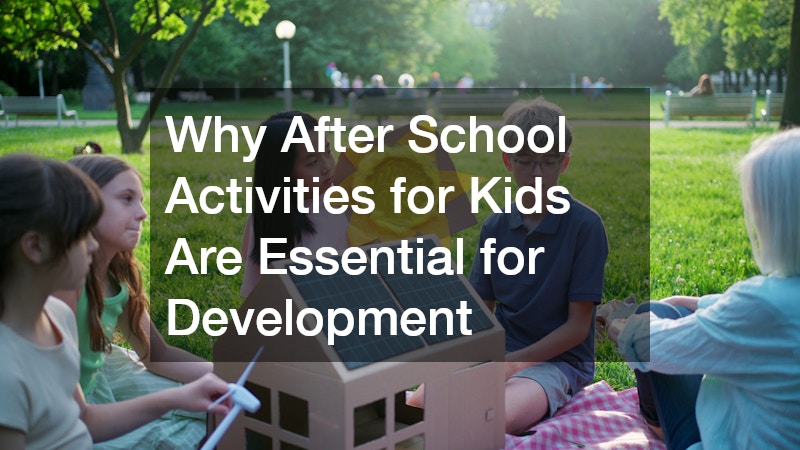Why After School Activities for Kids Are Essential for Development


As parents, we all want what’s best for our children, not just academically but also socially, emotionally, and physically. While school lays the foundation for learning, it’s often the hours after school that offer rich opportunities for growth. After-school activities for kids play a critical role in shaping their overall development. These structured experiences go beyond mere entertainment; they help children explore new interests, gain confidence, and develop valuable life skills.
Whether your child is athletic, artistic, or academically inclined, the right after-school program can significantly enhance their personal and educational journey.
What Makes After-School Activities So Important?
The hours between the end of school and bedtime can be incredibly formative. Without structure, many kids spend that time in front of screens or engaging in unproductive behavior. After-school activities introduce healthy routines that foster discipline, creativity, and a love for learning.
Here’s why these activities matter:
- Structure and Routine: Helps kids transition smoothly from school to home life.
- Supervised Environment: Provides a safe and productive space while parents are at work.
- Skill Development: Enhances critical thinking, teamwork, and emotional regulation.
- Positive Peer Interaction: Encourages friendships outside the classroom.
When children participate in activities that interest them, they become more motivated, energized, and emotionally balanced.
How Do After School Programs Boost Academic Performance?
After-school programs aren’t just playtime—they can improve classroom performance. These programs often reinforce what children learn during the school day or introduce new educational content in a more relaxed setting. They encourage curiosity, problem-solving, and a love for learning.
Educational benefits include:
- Homework Support: Many programs offer guided homework time with academic help.
- Focused Learning: Small group settings allow kids to explore subjects at their own pace.
- STEM and Literacy Enrichment: Exposure to science, math, reading, and writing in fun, hands-on ways.
- Improved Time Management: Learning to juggle multiple activities teaches kids how to prioritize.
A study by the Afterschool Alliance found that students in high-quality after-school programs show improved attendance, better test scores, and greater interest in school subjects.
What Social Skills Do Children Learn Through Group Activities?

Social interaction is a crucial part of childhood development. After-school programs bring children together from diverse backgrounds and encourage collaboration. These activities help kids learn how to work as a team, resolve conflicts, and build lasting friendships.
Social-emotional benefits include:
- Teamwork and Cooperation: Sports, clubs, and group projects teach kids to collaborate.
- Empathy and Inclusion: Kids learn to accept different perspectives and cultures.
- Leadership Skills: Roles like team captain or group leader help boost confidence.
- Respect and Responsibility: Following rules and meeting expectations build maturity.
These life lessons prepare kids for real-world challenges and help them grow into emotionally intelligent adults.
Why Physical Activity Matters in After-School Programs
Many after-school activities involve movement, which is vital in a time when sedentary lifestyles are common among children. Programs that incorporate sports, dance, or outdoor play can dramatically improve a child’s physical health and mental well-being.
Key physical development benefits:
- Improved Fitness: Regular physical activity strengthens muscles, bones, and the heart.
- Motor Skills Development: Activities like gymnastics or martial arts enhance coordination and balance.
- Stress Reduction: Physical play reduces anxiety and improves mood.
- Healthy Habits: Encourages an active lifestyle from an early age.
Children who participate in sports or movement-based programs are more likely to maintain healthy routines into adulthood.
Choosing the Right After-School Activities for Kids
Not all programs are created equal. To maximize the benefits, parents should choose activities that align with their child’s interests and developmental needs. From creative arts to robotics, there’s something for every personality.
Consider the following when selecting a program:
- Child’s Interests: Ask your child what they enjoy doing.
- Program Quality: Look for certified staff and structured curricula.
- Convenience: Choose locations and schedules that fit your routine.
- Balance: Avoid overscheduling—kids need downtime too.
Whether your child thrives in sports, music, crafts, or science, the key is finding activities for kids that keep them excited and challenged.
What Happens When Kids Don’t Have After-School Engagement?

Lack of structured after-school time can lead to issues like boredom, screen addiction, or even risky behaviors. Studies show that unsupervised time after school is linked to poor academic performance and behavioral challenges.
Without enrichment:
- Children may feel isolated or unmotivated.
- Valuable time is lost that could otherwise be used for learning or skill-building.
- Parents may struggle with childcare gaps or scheduling stress.
Filling those hours with meaningful activity leads to better emotional health, stronger academic results, and improved family dynamics.
Final Thoughts
In today’s fast-paced world, after-school activities for kids offer more than just fun—they serve as essential building blocks for a child’s overall development. These programs help bridge the gap between school and home, fostering not just academic success but emotional intelligence, physical wellness, and social competence.
As parents, investing time in finding the right after-school program can have a lasting positive impact on your child’s future. With the right balance, your child can thrive inside and outside the classroom.